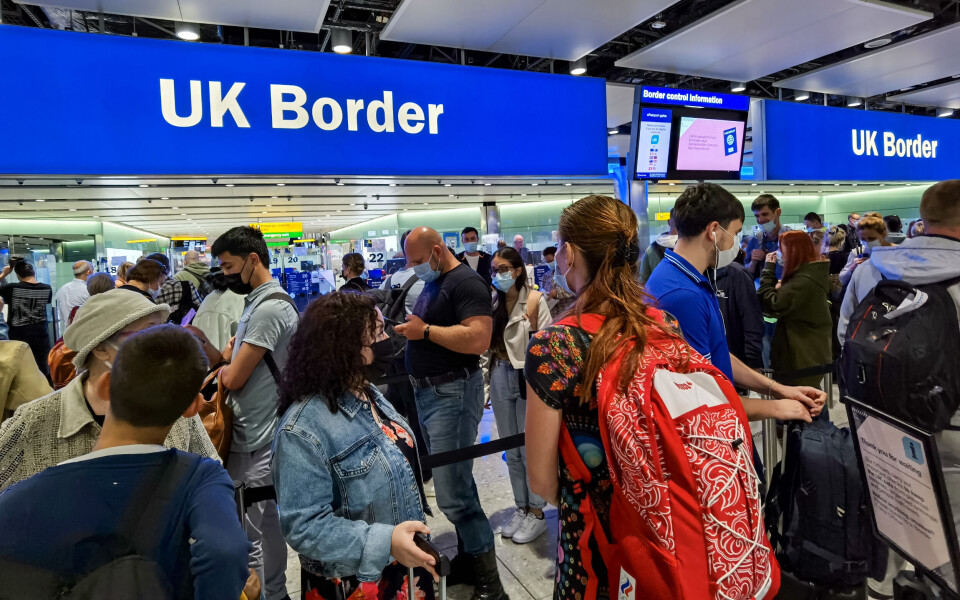-
90/180 days rule: readers tell of impacts on health and on family and working life
Rule affects Britons post-Brexit as well as other non-EU citizens such as Americans
-
Germany to prolong EU border checks: how travel from France is affected
Checks at land borders will take place until at least September 15, 2026
-
EES: Why am I fingerprinted every time at Nice airport?
Phase-in period is continuing and technical improvements are still awaited
Here is what we know about the UK’s new digital border scheme
British and Irish citizens are exempt, but EU and US citizens will have to pay a visa waiver fee

Visitors to Britain from European countries will have to apply and pay a fee for a visa waiver for short visits from the end of 2024 at the latest, the UK government has announced.
The European Union has confirmed that its own digital border scheme has been delayed until next year.
Apply and pay to visit UK
By the end of 2024, visitors from the EU, the US, Australia, and other countries that have visa-free access to the UK for short stays will have to apply and pay for permission before travelling.
The Electronic Travel Authorisation (ETA) scheme features in the 2022 Nationality and Borders Act, and the roll-out was initially planned for this year.
Read more: Five questions on how UK’s new border scheme could impact EU tourists
British and Irish citizens are exempt
The new requirements will not apply to British or Irish citizens, or those with a prior immigration status in the UK.
Those legally resident in Ireland will not need an ETA when travelling to the UK from within the Common Travel Area, but other visitors arriving in the UK via Ireland will require one.
The scheme “will enhance our ability to prevent the travel of those who present a threat to the UK”, a Home Office spokesperson said. It is a system of ‘upstream security checks’, meaning dangerous individuals are prevented from travelling before they get to the border.
Price yet to be set
The ETA is part of the UK’s plans to fully digitalise its borders by 2025.
It will first be rolled out for visitors from Qatar this October, before being extended to other Gulf states from next February, and finally to the rest of the world by the end of 2024.
The UK has previously used an electronic visa waiver system for visitors from Gulf Cooperation Council states. Applications cost £30 and had to be made between three months and 48 hours before travel.
The UK has said the cost of an ETA will be lower, and “in line with similar international schemes”. These generally cost between €5 and €30.
Valid for two years
As part of the application process, individuals will need to provide biometric details and answer a set of suitability questions.
It will be possible to apply via a mobile app, and most people will receive approval shortly after.
The ETA will be valid for two years, allowing visitors to make multiple trips to the UK without re-applying for permission.
The US, Canada, Australia, and New Zealand already use similar systems, while the EU is planning to launch its own equivalent, known as Etias.
EU equivalent scheme delayed
The Etias scheme has been delayed several times, and is now also expected to be operational in 2024.
This is partly due to delays to the digital Entry/Exit System (EES), which will record the details of non-EU citizens entering the Schengen Area.
Read more: Why the EU’s new Etias visa-waiver system has been delayed again
This will replace the need for passport stamps and make it easier to see if travellers have stayed for more than 90 out of every 180 days.
The EES was due to be implemented this May, but it is expected to be postponed until the end of the year.
There are reports that it might be pushed back even further, with President Macron said to favour a delay until after the Olympic Games in Paris next summer to avoid chaos at airports.
“The entry into operation of Etias can only take place five to six months after the launch of the EES,” said a European Commission spokesperson.
How EU Etias scheme will work
Under Etias, non-EU citizens living in countries that do not need a visa for short visits to the Schengen Zone (including the UK, US and Australia) will need to apply for authorisation before travelling to the bloc.
Travellers will be required to fill in the online application form – a process that is expected to take about 10 minutes and cost €7.
Up to 95% of applications are expected to be approved within minutes but, if further checks are required, the process could take up to two weeks.
Once granted, an Etias authorisation will remain valid for multiple trips over a period of three years.
Non-EU nationalities with valid cartes de séjour or visas for France will be exempt.
Related articles
Passports, Etias, EES: Changes to European border control in 2023
Do cruises count towards 90-day Schengen zone allowance?
Jersey lets French day-trippers use ID cards in bid to boost visitors
























